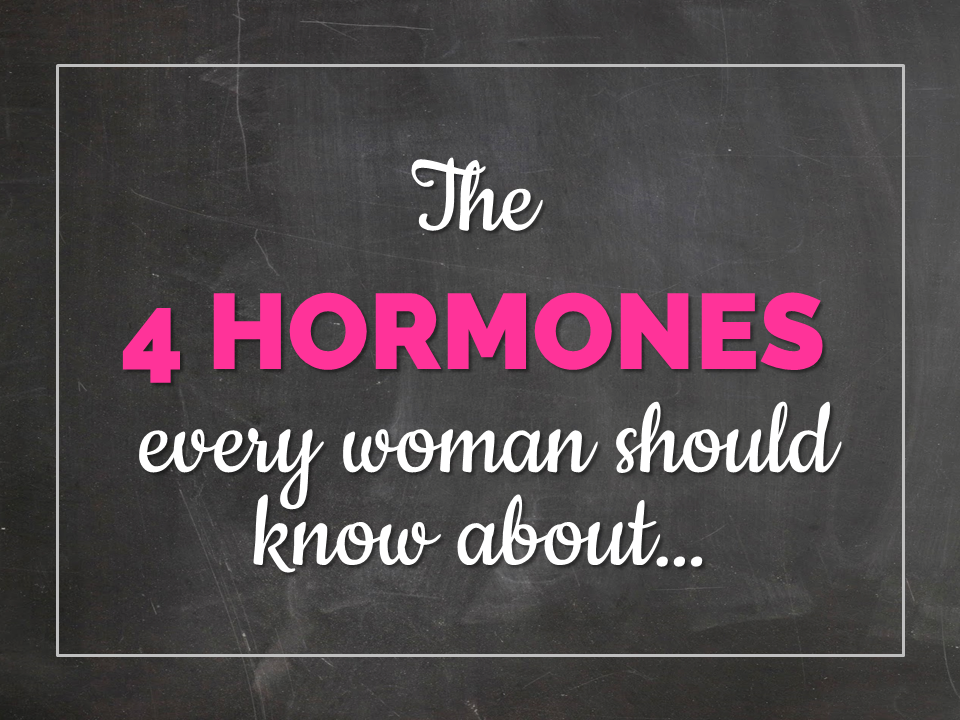If you’re a woman who’s over 40, and noticing a change in your shape (namely extra folds in your mid-section), then you need to know about four particular hormones.
These hormones work great together together when everything’s in balance.
But when you head into perimenopause and through menopause, and things become unbalanced, these four hormones will play a big role in how and where you gain fat.
In my latest webinar, I talked about these four hormones.
But since not everyone got to see it, I thought I’d bring them to you.
So, let’s start with Cortisol.
CORTISOL
When you’re stressed, your adrenal glands (located on top of your kidneys) release the hormone Cortisol.
And by stressed, I don’t just mean that your life is hectic and you’re overbooked.
Being stressed also encompasses feelings of fear, anger, shame, anxiety, and depression.
And when you’re feeling these feelings often, Cortisol can become a problem.
See, the human body is based on old technology that’s slow to change.
So any stressful emotion you feel translates into your body as immediate danger – like you’re about to be eaten by a bear.
That’s when your adrenal glands will release Cortisol.
Cortisol causes your blood sugar to rise so that you have energy to run from the danger.
And higher blood sugar then causes your body to release Insulin to send the sugar out to the working muscles (…more on Insulin in a bit.)
Now Cortisol is a great help in the bear scenario.
It causes your body to focus on what it needs to do to survive in the immediate future: Run!
But if there’s no bear, then that’s where you get into trouble.
Cortisol has taken all your energy and put it towards your working muscles.
And that means that there’s very little energy left for your other functions to work efficiently.
So, the functioning of your immune system, your thyroid, the release of melatonin to help you sleep, and the release of growth hormone to renew your cells… These are all now much less efficient, or barely working.
In addition, now that you’ve released sugar into your blood but you’re not actually running anywhere, Insulin will store that sugar somewhere – usually around the belly as fat.
Yup, that’s how you get belly fat from stress. Interesting, eh?
Now, more about Insulin
INSULIN
Insulin is a hormone produced by your pancreas to allow your brain, muscles, and any other working cells to take in sugar (nourishment).
You need insulin.
It’s like the shuttle bus that transports nourishment from your blood to your cells.
And this nourishment, or sugar, is either used immediately as fuel (like when you’re exercising), or it’s stored as glycogen in the muscles (future fuel, but limited storage), or it’s stored as fat.
So when you eat too much sugar or processed food, which is easily broken down into sugar as it’s been mechanically broken down from its original whole food form, Insulin production goes up fast.
And, as we saw with Cortisol, stress can also cause your Insulin production to increase.
An increase – or spike – in Insulin actually causes you to crave more sugar, and, over time, inhibits the hormone that makes you feel full.
As such, excess Insulin in you blood causes you to gain fat through a vicious cycle:
- You eat foods high in sugar or highly processed, or you’re stressed
- Your Insulin spikes
- Excess sugar in your blood gets causes stored by Insulin as fat
- And, in addition, the spike in insulin causes you to crave sugar, while not feeling full
- You eat foods high in sugar or highly processed
And, left unchecked, the cycle repeats itself.
Finally, if you continue to let this cycle run over and over through the years, your cells will likely become Insulin resistant, and your pancreas will eventually not be able to keep up with the demand of Insulin.
And that could lead to Type 2 diabetes.
However, there’s a lot you can do avoid that.
But first, let’s look at the final two hormones: Estrogen and Progesterone.
ESTROGEN AND PROGESTERONE
You may already know of the female hormones: Estrogen and Progesterone.
They’re created mostly in the ovaries, but also in your adrenal glands.
And your fat cells create Estrogen, too.
These two hormones, working together, actually help prevent belly fat when you’re younger, giving you more of an hourglass shape.
Before you enter menopause, when Estrogen is present (and balanced with Progesterone), Insulin sensitivity is actually increased and Cortisol is decreased.
That means that Insulin does its job, and the cells get more of what they need in terms of nourishment, and the stress hormone Cortisol is better controlled.
In addition, during ovulation, Progesterone helps lower your Cortisol even more, and can actually speed up your metabolism (which may be why you might notice being more hungry at that time of the month if you’re still having a period.)
But things change when you go into perimenopause and menopause.
Both Estrogen and Progesterone levels drop drastically as the ovaries pretty much stop producing them.
But what also happens, which may be even more significant, is that, although the amount of each hormone is much less, the ratio of Estrogen to Progesterone becomes completely unbalanced.
Because of the environment and foods that you eat, you may end up with a situation where Estrogen is very high compared to Progesterone.
It’s called ESTROGEN DOMINANCE.
Most women in menopause will end up with ESTROGEN DOMINANCE.
What happens here is is that although the ovaries have mostly stopped producing Estrogen and Progesterone, they’re still both being produced in the adrenal glands.
But, in addition, Estrogen is also:
- Being produced by your fat cells
- Possibly not being metabolized and excreted by your liver if you consume alcohol and coffee, various medications, and fast (processed) foods
- Being mimicked by compounds called xenoestrogens, when you’re exposed to plastics, pesticides and herbicides
The result is a higher ratio of Estrogen to Progesterone.
And with that, more Cortisol gets released, increasing the production of Insulin, in turn causing fat storage where?
You guessed it… around the middle.
In other words, Estrogen dominance leads to more belly fat.
But there’s good news.
YOU CAN CONTROL YOUR HORMONES
There are things you can do to prevent excess Cortisol, Insulin resistance, and Estrogen dominance.
Your hormones aren’t set in stone.
Your choices can change the way these hormones operate in your body.
And here are three simple (but not always easy) things you can do to better balance your hormones and reduce your belly fat:
REDUCE AND/OR REMOVE STRESS
If you reduce stress, or remove stressors from your life, you’ll decrease the stress hormone Cortisol, and in turn you’ll decrease Insulin, and store less fat around the belly.
In other words, if you become more willing to let go of things you don’t need or want, and find ways of being ok with your emotions, you can have a healthier body.
So, ideally, find time each day – just a few minutes – for calming, mindful activities that take you out of your head and help you see the bigger picture.
Things like focused breathing, meditation, yoga, and walks outdoors can fit the bill here.
EXERCISE DAILY
Moving every day will not only lift your fitness and mood, it will also help in reducing Cortisol and making your cells more Insulin sensitive (meaning less resistant.)
Different kinds of movement have different benefits, but all movement is good, especially if you’re not doing much now.
Start with 15 minutes a day.
That’s really all you need to make a significant difference.
And finally:
CHOOSE TO EAT WHOLE FOODS MOST OF THE TIME
When you eat food in its natural state, your digestive system needs to do work to digest it.
And that’s a really good thing.
Because the more work involved in digesting, the more time it takes to digest, and the more steadily Insulin will be produced (i.e. less Insulin spikes).
Sugary and/or processed foods, on the other hand, are very fast to digest and cause Insulin to be produced quickly and spike.
So choose whole foods most of the time.
Whole foods like fresh or frozen vegetables, fruits, legumes, lean meats, eggs, and whole grains are all good choices.
Have you noticed MORE BELLY FAT as you’ve gotten closer to, or moved through, menopause?
Let me know in the COMMENTS link below!
I’ve personally noticed more fat around my middle show up in the past months.
That’s why I got interested in looking at the roles our hormones play, and what we can do about turning things around.
And that’s why I started coaching women on how to find balance through menopause.
Because there are definite, and proven things you can do to change everything.
In the upcoming weeks, I’ll be putting out blog posts that cover in much more detail the ways to exercise, eat, and rest that can make a big difference in your experience of menopause.
Stay tuned!
And keep moving forward,
Debbie
P.S. If you haven’t already, grab your free copy of “Eating for Happy Hormones” where I get into the foods and eating guidelines for eating to reduce estrogen dominance. Enjoy!



Hi Debbie, Yes I am struggling with belly fat and weight gain since being in the menopause. I do try and walk for an hour a day but the fat doesn’t seem to want to disappear,
I am suffering with hot flushes, aching, tiredness, not sleeping, anxiety/panic and went to see my GP last October & she has put me on HRT Tibolone & Mirtizipine anti-depressant to help me sleep & cope with the anxiety. I take one day at a time but really hate this menopause as don’t feel like me anymore.
Thanks so much for that comment, Wendy!
It sounds like it’s been a tough go for you so far. Hopefully the medications are helping.
Besides the meds, there are things you can do, things you have the power to control, to feel better.
Exercise is one. Although you’re taking long walks now – which are great for stress relief – doing shorter bouts of more vigorous exercise could be more helpful for fat loss.
Also, the food you eat can have a huge impact.
I’ll be talking about both these topics in upcoming blog posts.
Hang in there, Wendy. You CAN make positive changes to feel better 🙂
Awesome stuff Debbie. Thanks for thinking of us gals. Keep up the good work.
Thanks Sylvie! 😊
Hi Debbie, thanks for a great summary of the 4-hormones I need to check, but even more, thanks for the tips on how to control them !
Thanks for the comment, Joanne! In the next few weeks I’ll go into even more detail on how to balance these hormones… stay tuned 🙂
Thanks for this very informative blog on hormones. I would be interested in hearing more on balancing them and the foods and guidelines
Thanks Cheryl!
And yes, I do offer a free PDF called “Eating for Happy Hormones” which you can grab here: https://debbie-harbec.lpages.co/eating-to-balance-hormones-freebie-and-list/
I also offer health coaching which you can find out more about here: https://debbie-harbec.lpages.co/6-week-coaching-program/
Hope those links help, Cheryl 😊
Debbie